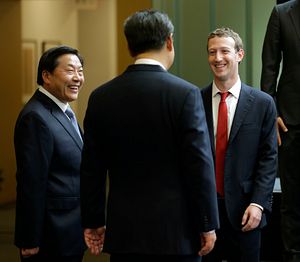Lu Wei, then-China’s internet czar, was listed as one of Time magazine’s 100 most influential people in the world in 2015. But by 2018, Lu was being described very differently — as a “shameless,” “extremely disloyal,” “double-faced man,” according to China’s top authorities.
On February 13, the Central Commission for Discipline Inspection (CCDI) — the highest internal-control institution of the Chinese Communist Party (CCP) — announced that Lu, former head of the Cyberspace Administration of China (the country’s top internet censor), has been expelled from the Party and dismissed from public office for stunning misconduct.
As The Diplomat reported, in November 2017 Lu was put under investigation by the CCDI for “serious violations of discipline.” In Chinese politics, once it is made public that an official is under CCDI investigation, it’s a certainty that the CCDI has already acquired some substantial evidence. The only question is when will the top authorities will reveal the accusations against the official in question to the public.
Thus, for most China observers, what’s startling about the latest announcement is not Lu’s downfall, but the CCDI’s extremely harsh accusations against him, using a laundry list of negative four-character idioms. In the statement, the CCDI depicted Lu as an all-around sinister man, both in his private and public life, in morality and manner. (The Chinese version of the statement can be found here.)
As a former deputy head of the Publicity Department of the CCP Central Committee, Lu is accused of “deceiving the CCP Central Committee, being defiant of rules, acting wantonly, groundlessly criticizing the Central Committee’s policies, and trying to obstruct the central authority’s discipline inspections.”
Lu is accused of frequenting private clubs, having an “arbitrary and tyrannical” leadership style, trading power for sex in a shameless way, and unscrupulously seeking personal influence. He is also accused of taking advantage of his posts to seek profits for others, accepting a huge amount of property, and abusing power and public resources for personal purposes.
The CCDI claimed that Lu, who is “extremely disloyal” to the Central Committee, has “completely betrayed each and every important political requirement and major discipline” for a Party member.
Lu is “a typical double-faced man,” the statement concluded. “Lu’s illegal gains will be confiscated and his case transferred to the judiciary.”
People’s Daily, the CCP’s official newspaper, pointed out on its social media platform that the CCDI’s accusations against Lu were the “sternest” yet, exceeding those of all other fallen officials since Chinese President Xi Jinping launched the anti-corruption campaign.
“The wording [against Lu] was harsher than before. It is very unusual. Previously, such [CCDI] statements would detail specific offenses,” Zhang Lifan, a prominent political commentator based in Beijing, told The South China Morning Post. “He might have done something to deceive the top leadership, leading to their great fury. ”
“The sentiment could be directly citing the instructions of some top leaders,” Zhang added.
As The Diplomat noted earlier, Lu, 58, began his career as a reporter; in 1991, he worked for Xinhua, China’s state news agency, where he was gradually promoted to the agency’s senior leader. In 2014, Lu’s career took off. That year China established the Office of the Central Leading Group for Cyberspace Affairs, or the Cyberspace Administration of China (CAC). Lu was appointed as the director of the office.
The CAC functions both as a government organ and a Party organ, which means it wields extraordinary power over China’s internet industry. Thus Lu was often called China’s internet czar. However, in 2016, Lu was suddenly removed from his position as director of the internet office.
There were widespread rumors as to what led to that change. In 2015, during Lu’s time in office, the CAC organized the first World Internet Conference in Wuzhen. Xi took the conference seriously and made a speech during the opening ceremony. To please Xi and elevate the conference’s status, Lu allegedly got some foreign students to pretend to be international professionals at the conference. Xi was reportedly furious when he found out.

































